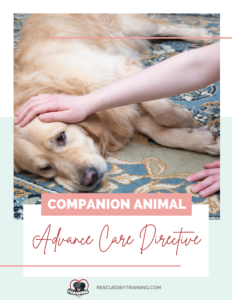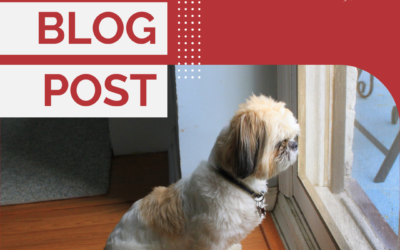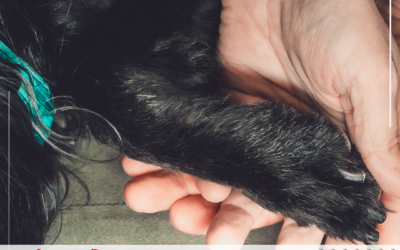It’s been almost a month since we said goodbye to our precious BooBoo. I’m still navigating grief and her loss daily. But I wanted to make this post as my first one back to help others.
As an end of life pet doula, and general advocate for planning, both for humans and animals, I always want people to think ahead and have plans in place. I strongly believe that planning reduces stress in the long-term. My post What If Your Animal Outlives You? talks about proactively thinking about difficult things and making arrangements for your animals in the event that they outlive you. Sure, these are tough things to think about, but having plans in place is better than having to scramble if you’re suddenly diagnosed with something terminal, or in an accident and your animals are left stranded and maybe left to be brought to a shelter.
Often in my role as a doula, I’m working with animals who are already at end of life and there’s not too many choices left to be made. But today, I’d like to talk briefly about having conversations and thinking about the time leading up to those moments. In human doula end of life work, we talk about the importance of having an advance directive, or a living will, that makes your wishes clear about who should speak for you and what medical decisions you want, or don’t want, if you are unable to speak for yourself.
 And I think it’s important that we think about doing the same, in a sense, for our animals. So I’ve created a Companion Animal Advance Care Directive for you to download.
And I think it’s important that we think about doing the same, in a sense, for our animals. So I’ve created a Companion Animal Advance Care Directive for you to download.
Making end-of-life decisions for your companion animal is likely one of the greatest responsibilities we have as guardians. Of course our animals aren’t able to tell us what treatments they would want to go through or not but you know your companion animal. You know what they love, what they hate, what makes them happy and when they’re scared.
If your dog is super fearful at the vet, are they going to want to tolerate in office chemotherapy weekly? Is that stress worth the extra time it might buy you? If your dog lives to eat and just loves food and chemo is going to make them super nauseated, is that a negative quality of life side effect you’re willing to have them live with? Is having a dental done on a senior dog worth risking anesthesia and reducing pain knowing that anesthesia is generally safe and well tolerated and might give them a year or two of no mouth pain and improved quality of life, if the dental goes well? Many questions like these are questions to discuss with your vet team when or if the time comes, but I do think there’s value in having conversations as a family or thinking about what we are or are not willing to do for our animals at different stages of their life.
An owner would likely be far more inclined to do certain treatments or surgeries on a younger dog than a 15 year old senior, both for the amount of time that the dog would have left to benefit from the outcome of the treatment but also for how well they would handle the procedure.
Often when we don’t have conversations about what treatments we are willing or not willing to do for our animals, what we’re willing to put them through or not put them through, we then make these decisions based in the heat of the moment, often purely based on high emotions or sometimes based on finances, because…life happens. And if we don’t plan or aren’t prepared – emotionally or financially, then we are stuck. If we plan and think about what outcomes or decisions we would want and they are well thought out and in the best interest of our animals, then we are better prepared to handle what gets thrown our way. As difficult as it is and how easy it is to just not think about yucky stuff when you have a fun, bouncy, young puppy, it’s important to think about difficult choices and decisions well in advance of old age or when a pet is sick or frail, when you’re not in the emotional trenches.
By planning ahead, we can honor our beloved animal by taking the time to think about different options and avoid making last-minute, emotionally charged decisions.
And that’s where the idea of an Advance Directive for your companion animal comes into play. Of course we all want as much time with our animals as possible but I urge people to prioritize quality time over quantity. Vets will always say it is better to say goodbye a week early than an hour too late. We never want our animals to suffer and we have the ability to prevent that from happening.
To me an advance directive for a companion animal weighs these factors:
- Diagnostics you’re willing to perform to figure out what’s wrong if it’s unclear: Are you willing to do invasive diagnostics like biopsies or scopes?
- Quality of life impact for the animal: Will the treatment have too great of a negative impact for the overall gain long-term?
- Quality of life for the humans: Your quality of life is important too. Watching your animal suffer through a difficult treatment is HARD.
- Financial implications are a fact of life, unless you’re independently wealthy. Can you afford a long treatment period over many months or years with work, life and schedule disruptions?
- Other disruptions: Schedule disruptions to work to make treatment appointments, sleep disruptions, disruptions to other household animals or children…these are all factors in deciding whether to pursue treatment.
- Is there a red line for you? Some activity or one thing that if your animal cannot do or enjoy that life is no longer worth living for them?
It may also include specific treatments or procedures you would or wouldn’t be willing to do including:
- Bloodwork
- Emergency surgery
- Placed on a ventilator
- X-rays
- Ultrasound
- CT scan
- MRI
- Pain management
- Placed in an oxygen room
- Place a feeding tube
- Have CPR done
- Receive blood transfusions
- Receive life-sustaining drugs
- Authorize humane euthanasia, if no other options were viable
You may also consider having a copy of your advance directive on file with your vet and local emergency room, in the event your dog ever got lost or was in the care of a sitter and something happened and you were not there to make decisions. You could also specify an alternate decision making person in the event they were unable to reach you.
Doing regular, quality of life assessments at least once a year during the lifetime of your pet can help set a baseline for comparison and can help you notice early changes that you may not have noticed otherwise. Year over year comparisons, done on birthdays or gotcha days, so you don’t forget to do them and so you’re doing them on a consistent day each year, can be incredibly helpful benchmarks.
It’s important to also revisit this document, at least annually, much like humans should be doing with their own end-of-life documents. These are “living documents” meaning they are subject to change as time goes on. As your animal ages or situations change, it is reasonable that your advance directive would change.
Last year I was on the podcast Risk! as part of the Grief stories, For The Love of Charlie and Then Some. Storyteller David Crabb told his gut wrenching story about losing his little dog Charlie and then following the replay of the story, David and I discussed it and reflected on it, since the story had aired originally several years earlier. David’s story epitomized the making decisions in the heat of the emotional turmoil. They did everything they could for Charlie and were often thrust into making life and death decisions for Charlie with an iPad being shoved in their hands for payment at the animal hospital and no time to process or really think about anything. They had to make decisions right then and there.
Companion animals are family for me, as they likely are to you. And just like if I had a human child, it’s my responsibility to ensure there is a plan in place for them. Download yours today. I can help you make a plan through my doula services. You can schedule a session here!
![]()




